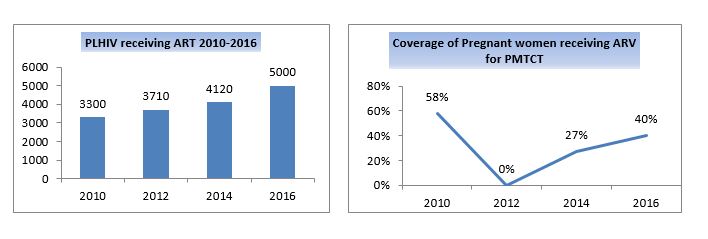Sociodemographic data
- Total population (in millions) : 192.8
- Maternal mortality per 100 000 live births :178
- Life expectancy at birth (years) : 66
- Total fertility rate (births per woman) : 3.7
- GNI per capita, PPP (current international US$) :5 320
- Health expenditure, total (% of GDP) : 2.6
- Health expenditure per capita (current US$) : 36
- Human Development Index Value :0.55
HIV care cascade and progress towards 90-90-90

Epidemiological data (2016)
HIV estimates and case notification
|
|
Estimated |
Reported |
|
HIV prevalence in general population |
0.1 |
|
|
People living with HIV (PLHIV) |
130 000 [120 000 - 150 000] |
20 639 |
|
New infections |
19 000 [17 000 - 21 000] |
5156 |
|
AIDS-related deaths |
5500 [4500 - 6600] |
320 |
|
|
|
|
HIV in specific populations
|
|
Survey data |
|
Size estimate |
Routine testing and VCT data |
|
|
Key populations |
Prevalence |
|
|
No tested |
HIV+ cases (%) |
|
Sex workers (SW) |
2.2 cluster sampling- (n=72,364)/ 2016 |
|
136 000 (2011) |
||
|
Men having sex with men (MSM) |
5.4% (n=6773) |
|
|||
|
People who inject drugs (PWIDs) |
38.4% (n=7862) |
|
99 000 (2011) |
||
|
Prisoners |
NA |
|
|||
|
Populations in health settings |
|
|
|
|
|
|
TB patients |
|
|
|
||
|
Pregnant women |
.03% (n=26,510/ 42 sites in 9 districts, 2010 |
|
|
||
|
Blood Donors |
|
|
|
||
|
Clients of testing services |
|
|
|
||
Response
Policy implementation
|
|
|
|
Policy CD4 threshold adults and adolescents |
Treat all |
|
Recommended initiation threshold children |
Treat all |
|
Policy of lifelong ART to pregnant & breastfeeding women |
Option B+ |
|
Implementation of lifelong ART to pregnant & breastfeeding women |
Done in a small number of MCH sites |
|
Implementation of national policy on viral load monitoring |
Not implemented |
HIV testing coverage in key populations *
 Antiretroviral therapy and PMTCT coverage
Antiretroviral therapy and PMTCT coverage
References
1 http://www.prb.org/pdf16/prb-wpds2016-web-2016.pdf; (2) WHO.EMRO Regional Surveillance Data; (3) WHO/UNAIDS data spectrum 2016; (4) Global AIDS Monitoring (GAM) 2016.*These are approximate estimations based on the latest available data for number of people tested and size estimates.










